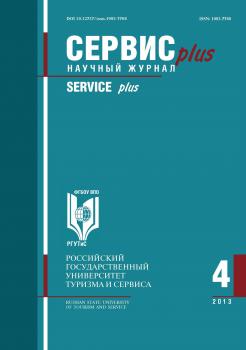St. Petersburg, Russian Federation
The tourist potential of regions of the Northwestern Federal district (NWFD) is studied by the author in the context of the rating, compiled by the magazine "Rest in Russia" [“Otdykh v Rossii”] and the center for information communications "Rating", which has analyzed the tourist attractiveness of Russian regions. The article includes the table which shows the presence of the natural, cultural, and educational resources in NWFD for the development of a particular type of tourism and the available means of accommodation (their types and their quantity according to the three reservation system – Booking, Tripadvisor and Ostrovok). The analysis of this table concludes what types of tourism are in the priority for each subject of the Federal district. The main types of tourism developing in NWFD, according to the author, are the business tourism, cultural tourism, rural tourism, environmental tourism, water tourism and sport tourism. The article presents a SWOT analysis of the tourist-recreational complex of the NWFD which shows that the government should create conditions for tourism development. The author also analyses the impact of tourism clusters on the main areas of development of the region (economic, social and cultural, ecological and natural) and then the possibility of using the tourism resources potential of NWFD subjects. The main idea of the article is that tourism as a specific multiplicative sphere stimulates the development of other sectors of the economy such as: trade, catering, transport, agriculture, production of consumer goods, medical and other services. This fact acquires special importance in the conditions of economic instability and the need for economic growth. On the basis of the SWOT analysis the author proposes measures to the development of the tourism clusters in the regions of NWFD, which include the following: 1) infrastructure development in NWFD; 2) promotion program of NWFD and its regions separately; 3) the development of interregional cooperation and participation in projects for the creation of common tourist programs; 4) focus on the development of the most promising tourist destinations in the district. It is concluded that NWFD, filled with various tourist and recreational resources, has a convenient conditions for the establishment and development of tourist clusters, therefore the huge potential of the tourist market of NWFD is necessary to be used correctly, we should work on its development and increase inbound flows into the country. NWFD can attract not only Russian but also foreign tourists with its sufficient natural, cultural, environmental, educational resources.
tourism clusters, tourism, tourism resources, regions of NWFD
1. Caldito L.A., Dimanche F., Mazina A., Fedulin A., Vetitnev A., Apukhtin A., Kruzhkov D., Kurbanov E., Pecheritsa E., Sakharchuk E., Sharafanova E., Romanova G., Alexanyanc G., Tatarskikh Iu., Belosluttseva L., Smit N., Kryukova O., Vapnyarskaya O., Ilkevich S., Kharitonova T. et al. Tourism in Russia. TEMPUS Project "NETOUR: Network for Excellence in Tourism through Organization and Universities in Russia" / Project Co-funded by the European Union. Spain, 2015. 28 p.
2. Volkova O.N. Metodologiya makroregional'nogo planirovaniya razvitiya turistsko-rekreacionnogo kom-pleksa Severo-Zapadnogo federal'nogo okruga // Regional'naya ekonomika: teoriya i praktika. 2012. № 23. S. 54-63.
3. Pecherica E.V. Klasternyy podhod k upravleniyu konkurentosposobnost'yu hozyaystvuyuschih sub'ektov v industrii gostepriimstva. Regional'naya ekonomika: teoriya i praktika. 2012. № 22. S. 46-53.
4. Kozlovskaya T. Vlast' dolzhna sozdavat' usloviya dlya razvitiya turizma, a ne sochinyat' tury vmesto turo-peratorov. Turisticheskiy biznes Sankt-Peterburga. URL: http://pitert.ru/news/tatyana-kozlovskaya-vlast-dolzhna-sozdavat-usloviya-dly (data obrascheniya 24.01.2016).
5. Kosyakova I.V., Karpova G.A., Khoreva L.V., Suraeva M.O., Maslentseva N.Yu. Organisational model of the congress and exhibition cluster in the field of business travel. IEJME: Mathematics Education. 2016. T. 11. № 7. S. 2592-2607.
6. Kol' O.D. Konceptual'nye osnovy formirovaniya klastera turistskih predprinimatel'skih struktur po v'ezdnomu turizmu v krupnom gorode // Problemy sovremennoy ekonomiki. 2010. № 1 (33). S. 379-383.
7. Yashalova N.N., Ruban D.A. Development of green business as an approach to financing the greening of economy. Economic and Social Changes: Facts, Trends, Forecast. 2016. № 5 (47). S. 219-237.
8. Polyakova A.G., Simarova I.S. Regional'noe ekonomicheskoe prostranstvo i territorial'noe razvitie: ocenka deystviya sil svyazannosti // Vestnik UrFU. Seriya: Ekonomika i upravlenie. 2014. № 2. S. 48-60.
9. Kurushina E.V. Rasshirenie konceptosfery regional'nogo ekonomicheskogo razvitiya samoorganizuyuschihsya sistem. Tyumen', 2014. 212 s.
10. Panikarskaya N.I., Stacenko A.A., Ruban D.A. Turisticheskiy obraz regiona v setevom prostranstve: pro-blema kachestva informacii. Oykumena. Regionovedcheskie issledovaniya. 2015. № 1 (32). S. 80-92.
11. Nikitina O., Akimova O. Cultural-historical heritage as an factor of regional economic development. V sbornike: Proceedings of the international conference on sustainable cultural heritage management societies, institutions and networks. edited by Lusia Marchegiani. Rim, 2013. S. 499-510.
12. Nikitina O. Innovative trajectory of formation investment projects of tourist cluster in Russia. V sbornike: Scientific enquiry in the contemporary world: Theoretical basic and innovative approach. TitusviHe, FL, USA, 2012. S. 124-127.
13. Andrades L. Is sustainable tourism an obstacle to the economic performance of the tourism industry? Evidence from an international empirical study. Journal of Sustainable Tourism 23(1):47-64 · November 2014. DOI:https://doi.org/10.1080/09669582.2014.909447.
14. Dimanche F., Roe P., Hrymak V. Assessing environmental sustainability in tourism and recreation areas: a risk-assessment-based model. Journal of Sustainable Tourism 22(2) · September 2013. DOI:https://doi.org/10.1080/09669582.2013.815762.
15. Yakovleva-Chernysheva A.Yu. Teoretiko-metodologicheskie podhody k formirovaniyu rekreacionnogo klastera // Rossiyskoe predprinimatel'stvo. 2011. № 1. Vyp. 1 (175). S. 130-134.
16. Ponedel'nik A.A., Ruban D.A. Ekonomicheskie usloviya stanovleniya mezhdunarodnyh turistskih destinaciy v regionah Rossii // Nacional'nye interesy: prioritety i bezopasnost'. 2016. № 9 (342). S. 118-128.

















